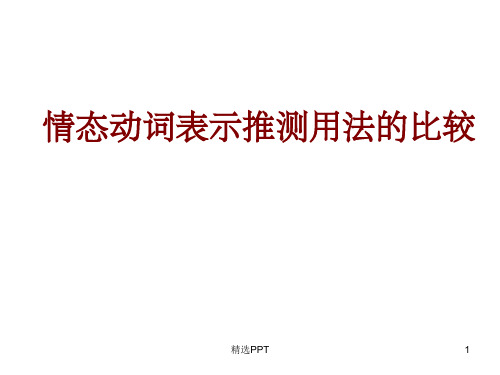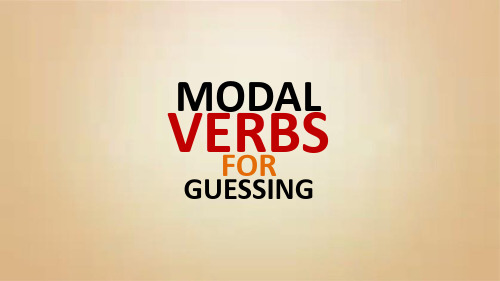8.情态动词表推测ppt课件
合集下载
《情态动词表示推测》PPT课件

会说出这种话的
• The weather in Tibet
could be cold now. 精选PPT
4
may
• may + 动词原形
• may have done (对过去
• may not +动词原形
• (对现在情况的推测), 其肯定式表示“可能”; 否定式表示“可能不”.
• He may be right; I may not be right.
came to see us.
school today.
• --It can’t be Terry. He’s now in London.
can’t have done (对过
•can’t + 动词原形(对现 在情况的推测),表示不
去情况的推测),推测 某事不可能已经发生。
可能.
精选PPT
3
could
情态动词表示推测用法的比较
精选PPT
1
must 只用在肯定陈述句中
• must+状态动原(对现 在情况的推测),表示 满有把握,“一定、想 必已”
• The man could eat all those apples, so he must have a good digestion.
• She must dislike such a man.
精选PPT
11
(may表推测不用于疑问句:)
• 那会是真的吗
情况的推测),对已经 发生的事进行推测,意为 “可能已......”;否定式表 示 “可能还不.......”
• She isn’t here by now; she may have missed her train.
• The weather in Tibet
could be cold now. 精选PPT
4
may
• may + 动词原形
• may have done (对过去
• may not +动词原形
• (对现在情况的推测), 其肯定式表示“可能”; 否定式表示“可能不”.
• He may be right; I may not be right.
came to see us.
school today.
• --It can’t be Terry. He’s now in London.
can’t have done (对过
•can’t + 动词原形(对现 在情况的推测),表示不
去情况的推测),推测 某事不可能已经发生。
可能.
精选PPT
3
could
情态动词表示推测用法的比较
精选PPT
1
must 只用在肯定陈述句中
• must+状态动原(对现 在情况的推测),表示 满有把握,“一定、想 必已”
• The man could eat all those apples, so he must have a good digestion.
• She must dislike such a man.
精选PPT
11
(may表推测不用于疑问句:)
• 那会是真的吗
情况的推测),对已经 发生的事进行推测,意为 “可能已......”;否定式表 示 “可能还不.......”
• She isn’t here by now; she may have missed her train.
《情态动词表推测》课件

根据所给语境,选择合适的情态动词表达对过去事实的 推测。
通过实际语境中的情态动词使用,培养语言逻辑思维能 力。
练习题三:对将来事实的推测
掌握对将来事实的推测 理解情态动词在时间表达中的运用
提高语言表达能力
练习题三:对将来事实的推测
01
练习内容:
02
根据所给语境,选择合适的情态动词表达 对将来事实的推测。
《情态动词表推测》ppt课件
目录
• 情态动词表推测的定义 • 情态动词表推测的用法 • 情态动词表推测的注意事项 • 情态动词表推测的练习与解析 • 总结与回顾
01
情态动词表推测的定义
什么是情态动词
01
情态动词是表示说话人的语气和 态度的动词,它们通常与助动词 结合使用,表达可能性、必要性 、意愿等意义。
02
情态动词表推测的用法
对现在事实的推测
总结词
表示对目前情况的推测
详细描述
情态动词如“may”,“might”,“could”等可以用来表示对目前情况的推 测,通常基于某些证据或迹象,但不确定。例如:“It may be raining today ,based on the dark clouds in the sky.”
以上内容仅供参考,具体内容可以根据实际需求进行修改和 调整。
04
情态动词表推测的练习与解析
练习题一:对现在事实的推测
掌握对现在事实的推 测
提高语言实际运用能 力
理解不同情态动词的 细微差别
练习题一:对现在事实的推测
01
练习内容:
02
03
04
根据所给语境,选择合适的情 态动词表达对现在事实的推测
02
常见的情态动词有can、may、 must、should等。
情态动词表示推测ppt课件

费,遗憾,不好后果)
精选ppt
1
情态动词表示推测的用法
1.对现在(事情)推测: must + v. (肯定)
may/might/could/can+v. (可能)
(情态动词+ 动词原形) can’t + v. (不可能)
2.对过去(事情)推测:(情态动词+ 完成式)
must have done (表肯定性推测) “肯定,准是,” can’t /couldn’t have done (表否定性推测)“不可能”
It must have rained last night,for the
road is wet.(It can’t/couldn’t have rained
last night.)
精选ppt
2
1.It must have rained last night.for the ditch(水道,渠道) is full of water.
精选ppt
7
must表推测的反意疑问句:
反意问句部分永远不带must.
1.She must be a teacher,isn’t she?
2.She must have gone to Shanghai,
hasn’t she?
3.She must have gone to Shanghai
yesterday, didn’t she?
情态动词表示推测的用法
1.对现在(事情)推测 2.对过去(事情)推测
must +v. (肯定) might/could/may/can +v. (可能) can’t+v. (不可能)
1.must have done (表肯定性推测) “肯定,准是,”
情态动词表推测课件.ppt

He can`t be at home. = It is impossible that he is at home. 他一定不在家。 (2)can /can`t+ have done,表示对过去发生的动作进 行推测。
He can`t have gone to Shanghai for I saw him a
首页
上一页 下一页
二、 “ought to+have+done”
• 表示过去应该做而实际并没有做,译成 “理应做……”,往往表示遗憾。与 “should+have+done”用法基本一样。
I ought to have gone home last Sunday. 我理 应上星期日回家。
• You ought not to have given him more help. 你不应该帮助他那么多。
注:must表示推测时很少用于将来的情况。一般不用
He must come tomorrow.可用It`s certain / I`m
sure that he will come tomorrow.
首页
上一页 下一页
2. can / could的用法 (1)can表示推测“可能性”时,往往用于否定句或疑 问句。Can`t“一定不”,can在疑问句中意思是“会、可 能”。
minute ago. 他不可能去了上海,我刚才还看见他。 It`s so late. Where can she have gone? 天晚了,她可 能去哪儿了呢?
首页
上一页 下一页
3. may和might的用法 (1) may, might表示推测“可能性”时,意思 是“可能”、“也许”
He may / might be American. = It is possible
He can`t have gone to Shanghai for I saw him a
首页
上一页 下一页
二、 “ought to+have+done”
• 表示过去应该做而实际并没有做,译成 “理应做……”,往往表示遗憾。与 “should+have+done”用法基本一样。
I ought to have gone home last Sunday. 我理 应上星期日回家。
• You ought not to have given him more help. 你不应该帮助他那么多。
注:must表示推测时很少用于将来的情况。一般不用
He must come tomorrow.可用It`s certain / I`m
sure that he will come tomorrow.
首页
上一页 下一页
2. can / could的用法 (1)can表示推测“可能性”时,往往用于否定句或疑 问句。Can`t“一定不”,can在疑问句中意思是“会、可 能”。
minute ago. 他不可能去了上海,我刚才还看见他。 It`s so late. Where can she have gone? 天晚了,她可 能去哪儿了呢?
首页
上一页 下一页
3. may和might的用法 (1) may, might表示推测“可能性”时,意思 是“可能”、“也许”
He may / might be American. = It is possible
情态动词表推测课件

must —只能用于肯定句。 can, could —往往用于否定句
或疑问句。 can—肯定句,有时候可能会 may, might —不用于疑问句。
can’t — 不可能 should—按道理应该,理应
情态动词 表推测
语意
时态 句式
情态动词表推测的三种时态
1. 现在或将来 —情态动词 +do/ be 2. 正在进行 —情态动词 +be doing 3. 过去完成 —情态动词 + have +done
VMEORDBASL FOR
GUESSING
WHAT
IS IT ABOUT ?
WANT TO KNOW MORE ABOUT IT ?
情态动词 表示推测
情态动词 表推测
语意
时态 句式
情态动词表推测的语意与句式
must —肯定,一定 may — 可能 might — 或许
might not — 或许不 may not — 可能不 couldn’t — 不可能
语意 句式
情态动词 肯定的推测
must
可能的推测ቤተ መጻሕፍቲ ባይዱ
may, might
情态动词表推测 时态
对将来 /一般 对进行
对过去
+V. / be + be doing + have done
+V. / be + be doing + have done
否定的推测 can’t/couldn’t +V. / be
may/might not
+ be doing + have done
疑问的推测
can, could
情态动词表示推测 配套课件

A. should B. must C. wouldn’t D. can’t
知识小结
情态 动词 must
mபைடு நூலகம்y
can
对现在和未来的 推测
must do
may do
can do
对过去的推测 must have done may have done can have done
使用场合 肯定句
肯定句、否定句 否定句、疑问名
情态动词表示推测
知识讲解
must “一定;肯定”一般用于肯定句
e.g. Tom must be in the classroom. 对现在情况进行推测 The boys must be very cold in such a day! They must have heard this piece of news. 对过去情况进行推测
---Something ___D_____ to him.
A. must happen
B. should have happened
C. could have happened D. must have happened
4. He __B__ have completed his work, otherwise, he wouldn’t be enjoying himself by the seaside.
can“可能;也许”用于疑问句和否定句 e.g. Tom can’t be in the classroom. It is empty!
They can’t have heard this piece of news. 对过去情况进行推测 Can the story be true?
即时练习
知识小结
情态 动词 must
mபைடு நூலகம்y
can
对现在和未来的 推测
must do
may do
can do
对过去的推测 must have done may have done can have done
使用场合 肯定句
肯定句、否定句 否定句、疑问名
情态动词表示推测
知识讲解
must “一定;肯定”一般用于肯定句
e.g. Tom must be in the classroom. 对现在情况进行推测 The boys must be very cold in such a day! They must have heard this piece of news. 对过去情况进行推测
---Something ___D_____ to him.
A. must happen
B. should have happened
C. could have happened D. must have happened
4. He __B__ have completed his work, otherwise, he wouldn’t be enjoying himself by the seaside.
can“可能;也许”用于疑问句和否定句 e.g. Tom can’t be in the classroom. It is empty!
They can’t have heard this piece of news. 对过去情况进行推测 Can the story be true?
即时练习
相关主题
- 1、下载文档前请自行甄别文档内容的完整性,平台不提供额外的编辑、内容补充、找答案等附加服务。
- 2、"仅部分预览"的文档,不可在线预览部分如存在完整性等问题,可反馈申请退款(可完整预览的文档不适用该条件!)。
- 3、如文档侵犯您的权益,请联系客服反馈,我们会尽快为您处理(人工客服工作时间:9:00-18:30)。
“不可能,肯定不会”
;.
10
对过去推测的几组用法 2. can/ could have done
表对过去的时间里可能发生的事情的推测,一般只用于否定句和疑问句。
He can’t have finished the work so soon.
用于肯定句中,常用来表示本来可以完成而实际未完成的动作。 “本来能做…..(而实际上没做)”
;.
9
对过去推测的几组用法
1. must have done
表对已经发生的事情的推测,意为“一定,想必”,在句子中表示的是一种肯定的 推测。这种结构一般只用于肯定句。
He didn’t hear the phone. He
masulesteph.ave been
They can’t have gonoeut, because the light is still on. 否定形式:can’t (couldn’t) have done
We could have walked to the station, it was so near.
;.
11
对过去推测的几组用法 3. may/ might have done
1)表对已经发生的事情不太肯定的推测,意为“可能已经,或许已经”
If we had taken the other road, we might have arrived earlier.
The light is on, so my sister ___________ be at home.
may / might
;.
2
常用于表推测的情态动词
must (一定) will (很有可能) would (很有可能)
ought to
(应该,很有可能)
should (应该,很有可能)
can (可能) could (可能)
情态动词表推测
He mubset Curnane! He migbhet thinking. He cabne’t a common boy.
;.
1
表推测的三种句式 1. 在肯定句中一般用must, may/ might,语气逐渐减弱。
The light is on, so somebody _____ be at home. must
may (可能)
might (可能)
;.
最强 肯定推测
最弱
3
表推测的三种句式 2.在否定句中用can’t/ couldn’t(不可能),may not/ might not(可能不)。
It’s sunny. It ______ rain. can’t He ____m_a_y_n_o_t_____/mknigohwthnoowt to answer this question.
Exercise:
1. Whose earrings are these? They ____________ wears earrings sometimes.
may/ could/ bmeigMhatry’s. She
2. Carls _________________ come to the party tonight, but I’m not sure.
2)虚拟用法:表可以做,但却没有做。 He might have given you more help, but he was very busy.
;.
12
三种句式
肯定 否定 疑问
常用于表推测的情态动词
推 测
情态动词表推测的三种时态
肯定 否定
现在/一般 将来 过去/完成
几组对过去的推测
;.
must have done can/ could have done may/ might have done 13
对现在或一般情况的推测 “情态动词+be” “情态动词+be doing” “情态动词+动词原形”
must be listing He ____________ to music.
can’t be He _________ at home now. The light isn’t on.
He _____m_a_y_w_orikn his office.
5. You’d better take an umbrella. It ____________
rcaainn’tthis afternoon.
must
may/might/could
;.
14
6. It’s the library! So you _______ know shomutuisntg is not allowed here. 7. --Have you decided where to spend your summer holiday?
3. The telephone is ringing, but nobody answer it, he _______ be at hmomaye/. might/ could
4. --Is this Lan Qiang’s boxing glove?
--Yes, it _________ be his. This is his name on the back.
;.
4
常用于表推测的情态动词
must not
(禁止,不许)
(不用于推测)
can’t (肯定不, 不可能)
couldn’t
(肯定不,不可能)
may not
(可能不)
might not
(可Байду номын сангаас)
;.
最强 否定推测
最弱
5
表推测的三种句式
3. 在疑问句中,一般只使用can/ could。
Can your sister be at home now?
;.
7
情态动词表推测的三种时态
对将来推测,“情态动词+动词原形” must be
She _________ very happy when she opens the door.
;.
8
情态动词表推测的三种时态
对过去或已经完成的推测,“情态动词+have+过去分词”
may have rained The ground is wet. It _____________ yesterday night.
Could she have finished her homework?
【口诀】
can不肯, may/ could/ might不问,must不否问
注: can表示推测时,不用于肯定句;
may/might/could表示推测时,不用于 疑问句;
must表示推测时,不用于否定句或疑问 句。
;.
6
情态动词表推测的三种时态
